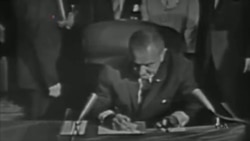ວັນພະຫັດມື້ນີ້ ເປັນວັນຄົບຮອບ 50 ປີ ໃນການລົງນາມ ທີ່ມີ
ຄວາມສຳຄັນປະຫວັດສາດ ຂອງກົດໝາຍວ່າດ້ວຍສິດທິໃນ
ການປ່ອນບັດຂອງສະຫະລັດ ຊຶ່ງໄດ້ສະໜອງ ໃຫ້ລັດຖະບານ
ກາງປົກປ້ອງຊາວອາເມຣິກັນ ເຊື້ອສາຍອາຟຣິກາ ຜູູ້ທີ່ຢາກ
ຈະຊົມໃຊ້ສິດທິໃນການປ່ອນບັດຂອງພວກເຂົາເຈົ້າ.
ວັນທີ 6 ສິງຫາ 1965 ເປັນມື້ລົງນາມໃນຮ່າງກົດໝາຍດັ່ງກ່າວ
ໂດຍ ປະທານາທິບໍດີ ສະຫະລັດ ທ່ານ Lyndon B. Johnson
ທີ່ໄດ້ເຮັດໃຫ້ ພວກກົດໝາຍກີດກັນ ທີ່ໄດ້ຈັດຕັ້ງຂຶ້ນມາ ໂດຍ
ລັດຕ່າງໆ ທີ່ຫ້າມ ບໍ່ໃຫ້ຊາວອາເມຣິກັນ ເຊື້ອສາຍອາຟຣິກາ ໄປປ່ອນບັດອອກສຽງ ຢູ່ຕາມ ໜ່ວຍປ່ອນບັດນັ້ນ ເຖິງແມ່ນວ່າ ພວກເຂົາໄດ້ຮັບສິດດັ່ງກ່າວພາຍ
ໃຕ້ບົດແກ້ໄຂລັດຖະທຳມະນູນ ມາດຕາ 15 ກໍຕາມ. ຫຼາຍໆລັດເຫຼົ່ານັ້ນ ແມ່ນຕັ້ງຢູ່ພາກໃຕ້ຂອງສະຫະລັດ ຊຶ່ງມີປະຫວັດອັນຍາວນານ ໃນການແບ່ງແຍກເຊື້ອຊາດຜິວສີ ທີ່ມີມາຕັ້ງແຕ່ຍຸກສະໄໝຂອງຂ້າທາດຢູ່ໃນຂົງເຂດດັ່ງກ່າວ.
ການຮັບຮອງເອົາກົດໝາຍວ່າດ້ວຍສິດທິໃນການປ່ອນບັດ ມີຂຶ້ນຫຼັງ ຈາກທີ່ເຈົ້າໜ້າທີ່ຕຳຫລວດ ໄດ້ໂຈມຕີທຳຮ້າຍຮ່າງກາຍ ພວກນັກປະທ້ວງ ຜູ້ທີ່ເລີ້ມຕົ້ນການເດີນຂະບວນຮຽກຮ້ອງເອົາສິດທິໃນການປ່ອນບັດ ຢ່າງສັນຕິ ຂ້າມຂົວ Edmend Pettus ໃນເມືອງ Selma ລັດ Alabama ເມື່ອເດືອນມີນາ ຂອງປີ 1965 ນັ້ນ. ເຫດການດັ່ງກ່າວກໍ່ໃຫ້ເກີດມີການຮຽກຮ້ອງເອົາສິດທິ ໃນທົ່ວປະເທດ ທີ່ນຳໄປສູ່ການກ່າວຄຳປາໄສທີ່ເປັນປະຫວັດສາດ ໂດຍ ປະທານາທິບໍດີ Johnson ຕໍ່ໜ້າ ກອງປະຊຸມຮ່ວມຂອງລັດຖະສະພາ ທີ່ໄດ້ຊຸກຍູ້ໃຫ້ຮັບຜ່ານກົດໝາຍດັ່ງ ກ່າວ.
ກົດໝາຍວາດ້ວຍສິດທິໃນການປ່ອນບັດ ແມ່ນເຫັນວ່າ ເປັນກົດໝາຍສິດພົນລະເມືອງ ທີ່ມີປະສິດທິພາບທີ່ສຸດສະບັບໜຶ່ງ ທີ່ໄດ້ຖືກຮັບຮອງເອົາເປັນກົດໝາຍໃນສະຫະລັດ. ມັນເປັນຂີດໝາຍ ອັນສູງສຸດ ຂອງການເຄື່ອນໄຫວເພື່ອສິດທິພົນລະເມືອງ ທີ່ດຳເນີນມາເປັນເວລານຶ່ງທົດສະວັດ ໃນເວລາທີ່ ຊາວອາເມຣິກັນເຊື້ອສາຍອາຟຣິກາ ໄດ້ພາກັນອອກມາປະທ້ວງຢ່າງເປີດເຜີຍ ເພື່ອເຮັດໃຫ້ການຈຳແນກກີດກັນທາງດ້ານຜິວພັນ ຢ່າງເປັນທາງການ ແລະ ການແບ່ງ ແຍກທາງດ້ານເຊື້ອຊາດຜິວພັນ ໃນທຸກໆດ້ານ ຢູ່ໃນສັງຄົມສະຫະລັດ ສິ້ນສຸດລົງ.
Thursday marks the 50th anniversary of the signing of the landmark U.S. Voting Rights Act, which provided federal protections for African Americans who sought to exercise their right to vote.
The August 6, 1965 signing of the bill by President Lyndon B. Johnson outlawed legal barriers erected by several states that effectively barred African Americans from the voting booth, despite them being granted those rights under the 15th Amendment of the U.S. Constitution.Many of those states were located in the southern United States, which had a long history of racial discrimination dating back to region's era of slavery.
Passage of the Voting Rights Act came after police brutally attacked demonstrators who had begun a peaceful voting rights march across the Edmund Pettus Bridge in Selma, Alabama in March of that year.The incident sparked a national outcry, leading to a historic speech by President Johnson before a joint session of Congress urging passage of the law.
The Voting Rights Act is considered to be the most effective piece of civil rights legislation ever enacted in the United States.It marked the high point of the decade-long Civil Rights Movement, when African Americans publicly demonstrated to bring an end to official racial discrimination and segregation in all aspects of U.S. society.










